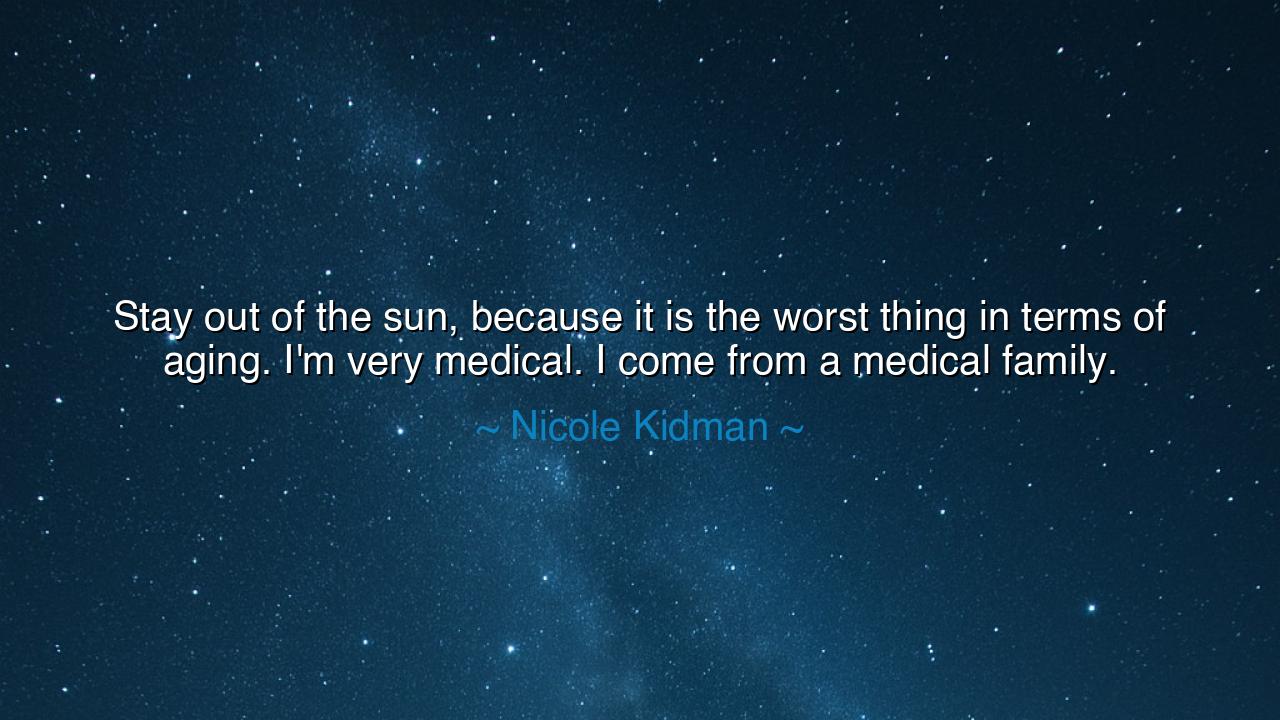
Stay out of the sun, because it is the worst thing in terms of
Stay out of the sun, because it is the worst thing in terms of aging. I'm very medical. I come from a medical family.






"Stay out of the sun, because it is the worst thing in terms of aging. I'm very medical. I come from a medical family." These words from Nicole Kidman speak to the ancient truth that the forces of nature, while essential to life, can also bring harm if not approached with wisdom and restraint. Kidman’s warning about the dangers of the sun is rooted in the timeless understanding that balance is key to a healthy and long life. The sun, a source of vitality and warmth, is also a force that, if overindulged in, can leave us vulnerable to the ravages of time—in both the body and the spirit.
In the ancient world, the Greek philosopher Hippocrates understood the profound effect that nature could have on human health. He spoke of the balance that must exist between the elements—earth, air, fire, and water—and how too much of any one force could lead to discomfort or disease. Just as Hippocrates warned against the excesses of food and drink, he would have also recognized the dangers of the sun when taken in excess. The ancient Greeks revered the sun for its life-giving properties, but they also understood the necessity of moderation in all things. It is in this careful balance that true health lies.
Kidman’s words resonate with ancient wisdom, reminding us that the sun, while essential for our existence, can also be a source of destruction if we are not mindful. The Egyptians, for example, who lived in a land bathed in the sun’s relentless rays, revered Ra, the sun god, as the giver of life. Yet, they also built their grand temples and cities with shaded spaces, recognizing the power of the sun and the need for protection. This ancient practice of balance—embracing the sun but also seeking shelter from it—offers a timeless lesson: exposure must be tempered with restraint for true well-being.
The dangers of excessive sun exposure are not a modern discovery but a part of the broader human understanding of how nature impacts the body. The Romans, too, understood the importance of protecting the body from the harsh elements. The baths of ancient Rome were designed not only to cleanse but also to shield the body from the overexposure of the elements. They created shaded spaces and protective coverings, knowing that while heat was essential for health, it must not be allowed to overtax the body. This understanding of moderation in all things was a core tenet of Roman philosophy, which sought to maintain harmony between the body, the mind, and nature.
In our own time, Nicole Kidman’s statement about the dangers of the sun speaks to the modern understanding of aging and the role of environmental factors in shaping the human body. The medical family she refers to is emblematic of a long tradition of recognizing that lifestyle choices—what we eat, how we move, how we engage with the world—greatly influence our health and longevity. The sun, in its unrestrained brilliance, can bring joy and light, but it can also accelerate the aging process by damaging the skin, causing wrinkles, pigmentation, and, more dangerously, increasing the risk of skin cancer. Kidman’s advice, drawn from her own medical background, is a call to be mindful of how we interact with nature, understanding its benefits without ignoring its potential harms.
Hippocrates, in his foundational work, taught that prevention is just as important as cure, a lesson that is as relevant today as it was in his time. To live in harmony with the forces of nature—whether the sun, the wind, or the earth—requires that we understand their effects on our bodies and adjust our behaviors accordingly. Just as ancient cultures sought to protect themselves from the elements, so too must we take responsibility for the choices we make regarding our health. To walk in the sun without protection, to seek exposure without thought, is to neglect the wisdom of the ancients and the teachings of those who have come before us.
The lesson from Kidman’s words is clear: health is not just the absence of illness but the active and intentional preservation of our well-being through careful thought and action. Like the ancients, we must learn to live in balance with the forces of nature. Moderation and protection are the keys to maintaining not only physical health but also the vitality that sustains us throughout life. Just as the sun can be both a source of life and a cause of damage, so too must we recognize that every force in life—whether natural, emotional, or intellectual—requires careful management. Let us take heed of Kidman’s advice, embracing the sun when needed but also seeking shelter when it becomes too much, for in this balance lies the key to a life that is both long and well-lived.






AAdministratorAdministrator
Welcome, honored guests. Please leave a comment, we will respond soon